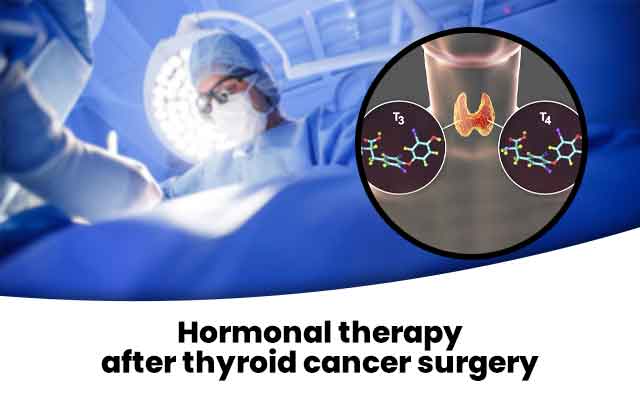Hormonal therapy is often recommended after thyroid cancer surgery to help suppress thyroid stimulating hormone (TSH) levels. TSH is a hormone produced by the pituitary gland that signals the thyroid to produce thyroid hormones. After removing all or part of the thyroid, TSH levels can rise, potentially stimulating any remaining thyroid cancer cells to grow and spread. Hence, hormonal therapy has become an important part of thyroid cancer treatment.
The need for hormonal therapy after thyroid cancer surgery
The pituitary gland regulates normal thyroid function by producing thyroid stimulating hormone (TSH), which signals the thyroid to synthesize thyroid hormone for bodily needs. Additionally, TSH spurs the growth of both the thyroid gland itself and potentially thyroid cancer cells. In turn, TSH levels are modulated by current blood concentrations of thyroid hormone.
When thyroid hormone is deficient, the pituitary ramps up TSH production. Conversely, if adequate or excessive thyroid hormone is circulating, the pituitary decreases TSH output accordingly through a negative feedback loop. Overall, the thyroid and pituitary work in tandem to maintain optimal thyroid hormone levels through TSH as the communication link between them.
Levothyroxine for hormonal therapy:
The most common type of hormonal therapy prescribed is levothyroxine, a synthetic version of the thyroid hormone thyroxine (T4). Taking levothyroxine daily replaces the thyroxine that would normally be produced by the thyroid gland. This sends signals to the pituitary gland to lower TSH production. The goal is to keep TSH suppressed to a very low level, often less than 0.1 mIU/L. This helps prevent the recurrence and spread of thyroid cancer.
Patients usually start levothyroxine therapy right after a thyroid cancer surgery in Kolkata. The initial dosage is based on the patient’s weight, age, and other medical conditions. Doctors monitor TSH levels every 6-12 weeks through blood tests to make sure the levothyroxine dosage is adequate for TSH suppression. The dosage may need to be adjusted over time.
Too much levothyroxine can cause side effects like heart palpitations, bone loss, and muscle weakness. Patients on suppressive therapy need to be monitored closely for signs of hyperthyroidism. Bone density scans and supplements like calcium may be recommended for some patients.
Other anti-thyroid medications may be used in combination with levothyroxine to enhance TSH suppression in high-risk thyroid cancer patients. These include Liothyronine (T3) and Liotrix (T4/T3 combination).
The nature of suppressive hormone therapy:
Suppressive hormonal therapy usually needs to continue for 5-10 years after thyroid cancer treatment or even lifelong if the cancer persists or has a high chance of recurrence. The surgical oncologist will monitor thyroglobulin levels as well as TSH levels to assess cancer status. If thyroglobulin levels become undetectable, the doctor may decide to relax the degree of TSH suppression over time.
In summary, hormonal therapy with levothyroxine and other anti-thyroid medications plays an important role in thyroid cancer treatment by suppressing TSH to prevent recurrence. Although it requires close medical monitoring and adjustment, suppressive therapy improves outcomes and survival for thyroid cancer patients after surgery.

